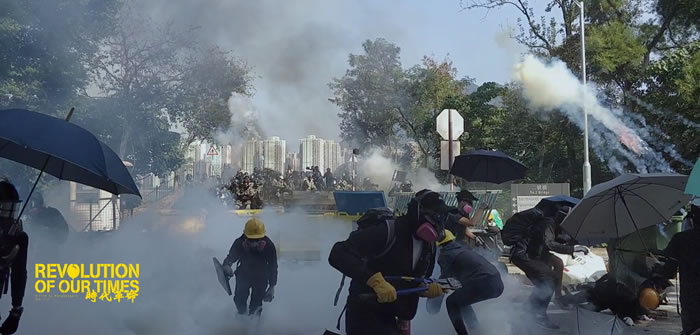“Revolution of Our Times” Team presents the US theatrical release of REVOLUTION OF OUR TIMES, the documentary film by Kiwi Chow. The film was the Official Selection at the 2021 Cannes Film Festival, and it won the Best Documentary Award at the 2021 Golden Horse Festival in Taiwan. The documentary will have its theatrical premiere in New York at Stuart Cinema in Brooklyn (December 10-16) and at Laemmle Noho (December 10-16); the film will also screen at the Roxie in San Francisco on December 18th and 19th.
Over the past fifty years, Hongkongers have fought for freedom and democracy but have yet to succeed. In 2019, the “Extradition Bill” to China opened a Pandora’s box, turning Hong Kong into a battlefield against the Chinese authoritarian rule.
The award-winning director of “Ten Years: Self Immolator,” Kiwi Chow, made this documentary to tell the story of the movement both with a macro view of its historical context and up close and personal on the front lines. The film covers seven teams of protestors with different stories which are put together as a comprehensive picture of the versatile movement.
We had an interview with the director of Revolution of Our Times, Kiwi Chow:
Cinema Without Borders: Revolution of Our Times is not only informative and shocking, but also very exciting to watch, how did you come up with the structure of your film?
Kiwi Chow: I’d divide the narrative direction into two parts: “big events” and “small characters”. For big events, I followed the chronological order so that people can grasp a holistic picture of the movement. As for small characters, due to the absence of major platforms and leaders, I used these small characters to tell the story, weaving them into different time frames along with the development of the big events. In this way, the audience’s perspective can sometimes be vast and sometimes become delicate as the movie unfolds, delivering a sense of excitement.
Another focus of the movie structure was the direction. Since there were two narrative threads, many minor parts did not follow chronological order and were categorised by their emotions instead. I deliberated over the structure both in terms of the development of the movement as a whole, as well as the emotional upheaval of Hong Kongers, especially that of protesters. I wanted to exhibit both. Every event possesses various sentiments, what to highlight was the most important aspect of the movie structure. As someone who has experienced the movement first-hand, when I could feel that people were running high emotionally, I’d find some high-spirited videos to match with it. I put a lot of effort into expressing the movement’s sentiment.
Last but not least, the movie opened with an ordinance (the extradition bill) and also closed with another ordinance (the national security law). The ending actually resonated with the beginning. Although the film did not discuss the law in detail, it underlined the national security law’s importance to this movement and Hong Kong’s development in the years to come.
One thing to add to the structure is that there was a general direction— from simple to complex, and from shallow to deep. What does that mean? In the early stage, the story narrative was much simpler and concise, but as it went on, particularly for the CUHK and PolyU parts, I took a more in-depth approach and told a more complicated story. I think as the audience gradually immerse themselves in the rebel, even though they might need more signals and explanations early on, they can go deeper once they fully enter the movie world. It also has to do with my considerations during movie production. Since I have more footage in the later stage, and the PolyU siege was the most traumatic and forceful resistance throughout the entire movement, I gave this part a greater length as the climax of the movie.
CWB: How challenging was the editing of Revolution of Our Times?
KC: I’d just talk a bit about the challenges because there were too many. First, there were many video I needed to request copyrights for. It requires a lot of work. We also encountered some issues and ended up not getting certain footages we wanted. Turned out we had to give up on some ideas because we didn’t have those clips. You got to think of an alternative, which was the most difficult part. Under the national security law, many media, be it pro-government or pro-democracy, have reservations. Many mainstream media may not be able to provide sufficient footages for me, greatly limiting my thoughts and my editing. I think this was the biggest challenge.
Another challenge was my personal emotions. Since I had to revisit these videos all the time, it triggered my emotions. I was always downhearted during the editing stage. I had mood swings and I always cried. I needed time to take a break and digest before I could continue editing again.
CWB: Will you consider to follow this movement in a future film?
KC: I don’t have such a plan as of now. Filming a documentary under the circumstances in Hong Kong these days, there is a greater risk associated with what I do. In the wake of the 2019 movement and the national security law, compounded with the pandemic, there’s simply no protests I can film in Hong Kong anymore. So I don’t have plans for a sequel currently. I’ll return to producing drama features.

